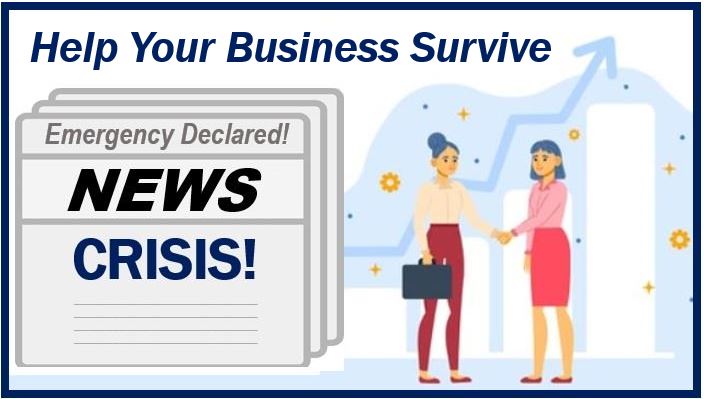
Business ownership carries many challenges and difficulties. Whether you’re a company devoted to moving help or a small corner shop selling any variety of goods or services, the perils and rewards of owning and operating your own business are many and varied. How you handle those crises can make or break your business.
That is why it is so important to make sure when there is a crisis, you have the skills, plans, and determination to see it through. Surviving a crisis is one of the greatest hallmarks for a business, so if you want your business to thrive, you have to be prepared for the worst.
Adaptation is Key
An inability to adapt is going to sink even the most successful small business. Large corporations might be able to get away with stagnation due to inertia and the sheer volume of their assets, but smaller businesses need to adapt with the time to succeed. They also need to be able to adapt amongst a crisis.
The current pandemic is an excellent example of such adaptation. With many states closing businesses to stem the tide of the spread of COVID-19, plenty of business sought out new ways to still provide products so they didn’t have to close down completely. Restaurants offer curbside pickup and increased delivery services.
Brewing companies did the same so that they could keep brewing and selling their goods without either wasting their products or having to completely shut down for months. This meant they would be ready for reopening with beer at the ready. Plenty of corporations and companies have let their employees work remotely to save on the costs of office space.
Of course, it can be hard to think on the fly and adapt on your own. As part of the adaptation process, or just as part of ensuring a successful business, it is vital that you as a business owner surround yourself with people knowledgeable in fields you aren’t.
No man is an island, after all, and having other people to provide advice and support that you can rely on is one of the defining traits of a leader. After all, what is a business owner if not a leader? The desire for control and recognition of when you lack control are just as important as adaptability. The two go together, after all, as part of adaptation is recognizing lack of control.

Pay Attention to Resource Allocation
This is in some ways a part of adaptation. One cannot adapt if they do not have the presence of mind and skills to reallocate resources to where they are needed most during a crisis. To bounce off the previous example, if a brewing company or restaurant is going to start offering delivery and curbside service due to a pandemic, and cannot seat customers during the crisis, they obviously don’t need to have waiters on staff.
They will need a host to manage the phones and websites for orders, cooks to make food, busboys to clean up, brewers if they’re a brewing company, and delivery drivers. Corporations that have the bulk of their staff work remotely can save on office space rent, which can carry over once the crisis has past.
Treating staff and stock as cold calculations rather than people is not easy and should be avoided at all costs. Still, in order to survive a crisis, resources need to be utilized where they are best able to help a business survive that crisis. Businesses that don’t use their resources to the best of their ability in the ways best suited to handle a crisis will not be able to survive. Knowing how to use your resources is a natural extension of adaptation.
It can be a difficult process, but programs or areas of the business that aren’t performing well or simply won’t be needed during a crisis will create costs that can be difficult to cover during such dire times. Keep a close eye on the numbers and make sure they stay in your favor. Trust the staff you can rely upon to do what they do best and to help with numbers and daily work. It can be tempting as an owner to do everything yourself in a crisis to save on costs, but that is counter to proper businesses operation.
Having a good team you can rely on during a crisis is just one of the many tools a business owner has to hand. An owner without a well paid and dependable team is just as bad as a corporate bigwig who cares only for profits and gives no regard to the wellbeing of their employees. Remember that when it comes to reallocate resources in a crisis, because if you start cutting people and consider them just as a resource, retaining staff will only become more difficult, during a crisis and afterward.

Plan and Improve
While the stress of handling a crisis might make it difficult, it can also provide a good time look over the numbers and see what can be improved once it’s business as usual once more. The hustle and bustle of business ownership can make it hard to really look at the data, but in the slowed business can provide some breathing space to look everything over in more detail.
For example, a brewing company can take a good hard look at what types of brews sell well, what food options are preferred if they have a menu, and the like. Restaurants can also likewise look at and prepare their menus for after the crisis.
Finding areas to reduce costs during the crisis to keep business open can carry over to the return to normalcy as long as the business plans work together. Obviously a restaurant can’t eliminate their wait staff once people can sit back down at tables, to use a previous example, but a company with most of the workers operating remotely might not need as much office space. Less office space means less rent, which means more savings. That is just one way moving help can save costs during and after a crisis.
Be Proactive
This is one of the most important facets of being a business owner, and it is all the more vital during a crisis. As a business owner, you need to act, not react. Reacting means you’re always catching up to whatever emergency or trend is affecting your business. Acting means you’re ahead of the game, adapting, thinking, planning, and preparing. Basically, being a business owner is like playing speed chess with a super computer.
While that may sound unfair, it’s also part of the thrill of business ownership. Business owners are not timid. They are aggressive, assertive, and driven. Use that drive and the drive of your employees to make sure you not only survive the crisis, but that when it’s over you can bounce back better than ever. Acting rather than reacting is what separates successful business owners from the unsuccessful ones.
Don’t Panic
During a time of crisis, it can be easy to start panicking and give in to despair and doom and all that other melodramatic fare. That is obviously counterproductive and also incredibly demoralizing to your employees. A business owner is a leader, and that leader must appear calm and ready to handle any crisis or emergency that may arise. At the same time, it’s also important to make sure your staff doesn’t panic, because panic creates stress and also increases the chance for mistakes.
As a business owner, you need to keep calm and assist your staff on doing the same. Together, you can ride out a crisis and ensure the business remains open, operating, and afloat for when the crisis is over. It is a challenge to stay calm among the chaos created by a crisis, but it is also one of the defining moments for a business owner.
For them, it’s one matter to own a business when times are good and operations smooth, but quite another when crisis strikes. How you handle the crisis, any crisis, that affects your business and your staff will not only define you as a business owner, it will also define your business.
There is a lot of responsibility in being a business owner. The trials and tribulations of owning a business can prove difficult even during normal business operations. When a crisis hits and a business has to face a shutdown, reduced capacity, or environmental damage from storms or floods, those are the truly defining moments. Those moments now only define the business owner, but also the business itself. How you respond to a crisis and lead you, your team, and your business through such difficult times will set the course for your business once matters return to normal.
It can be scary and stressful to own a business during a crisis, but you need to be prepared for such emergencies. Failing to plan is preparing to fail, as the saying goes, and that is why you need to do everything you can to ensure your business and its team are ready for whatever might happen.
Interesting related article: “What was the Wall Street Crash?“

